How to 'limit the editing area' in an Excel table?
php Xiaobian Xigua will introduce to you how to set the "restricted editing area" in the Excel table. By setting the worksheet protection function, you can selectively allow users to edit specific areas while limiting editing permissions in other areas. This can effectively protect the data integrity of the form and prevent misoperation. Next, we will explain in detail how to set it up so that you can better manage editing permissions in Excel tables.
Excel "Restrict Editing Area" has two setting methods according to different needs. Let's take a look at the specific operations below.
Setting method one:
If you want to restrict the non-editable area to a small amount, for example, only restrict the "Quantity" column in the chart from being editable, other areas can be edited, you can use this method.
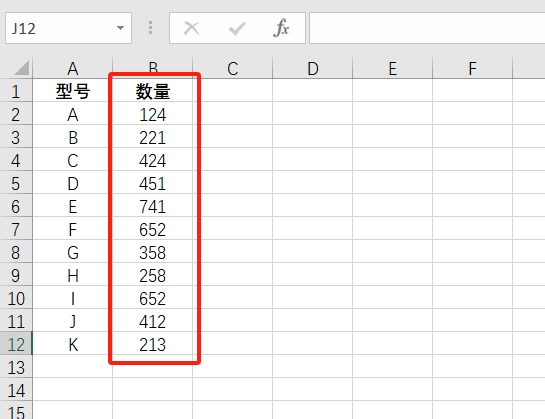
Setup steps:
1. After opening Excel, click the "triangle" icon in the upper left corner of the table to select the entire table. You can also use the shortcut key "Ctrl A" to select it.
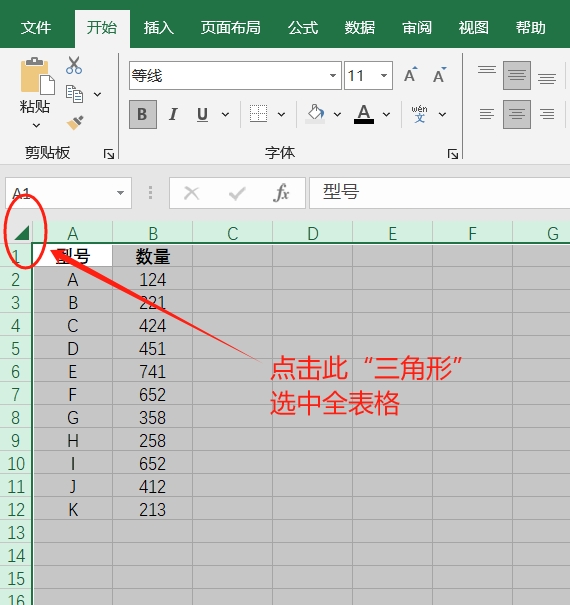
2. After selecting the entire table, right-click the mouse and select the [Format Cells] option.
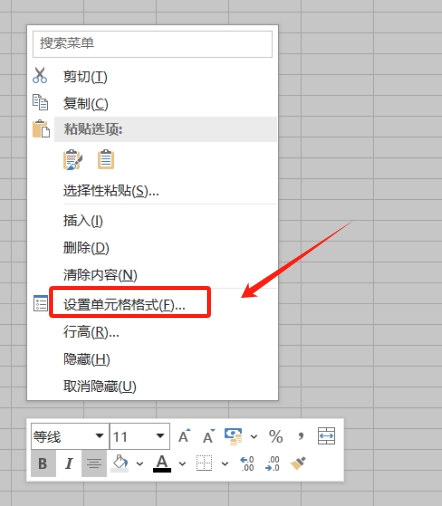
3. When the [Format Cells] dialog box pops up, select the [Protect] option, then remove the "√" in front of [Lock], and then click [OK].
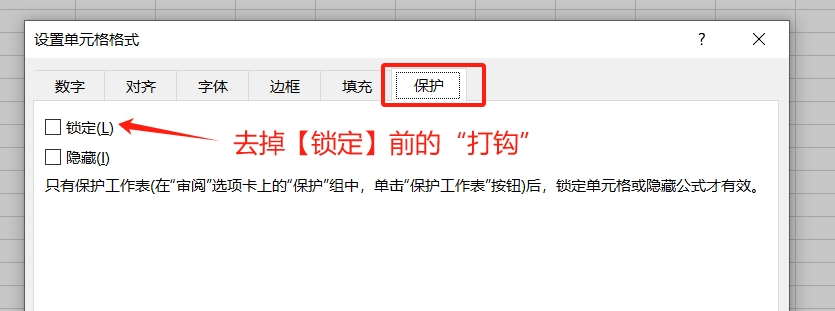
4. Return to the table, select the area that needs to be locked for editing, then right-click the mouse and select [Format Cells]. When the dialog box pops up, select the [Protect] option, check the [Lock] option, and then click 【Sure】.
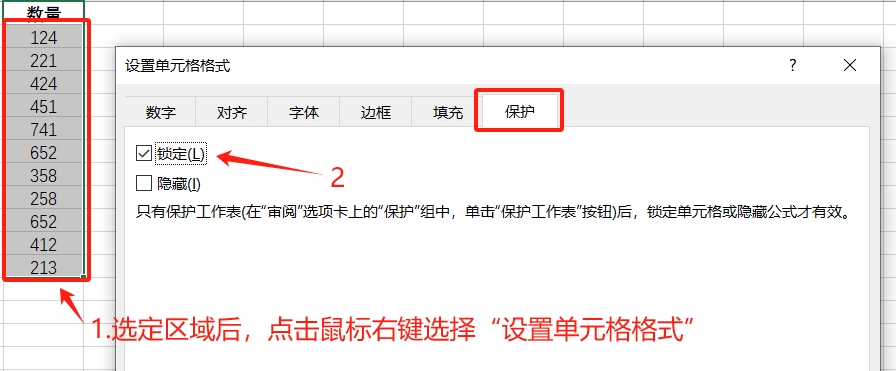
5. Click [Protect Worksheet] in the [Review] list of the menu tab.

6. After the dialog box pops up, check [Protect worksheet and locked cell contents], then enter the password you want to set in the password field, click [OK] and enter it again, the "Restrict editing" of the Excel table Area" is set.
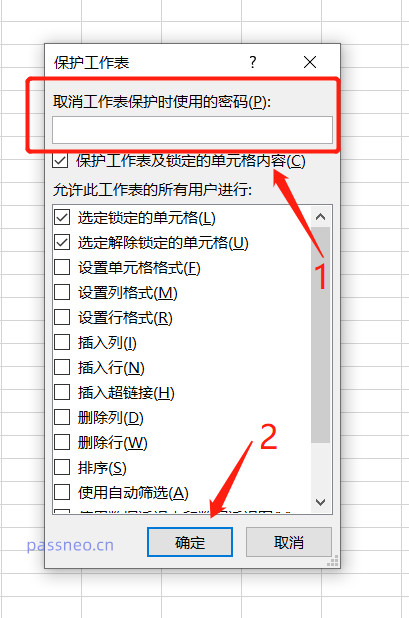
After setting it up, you can see that if you want to edit the "Quantity" column data, a prompt will pop up that the cell is protected and requires a password to change. Other areas can be edited freely.
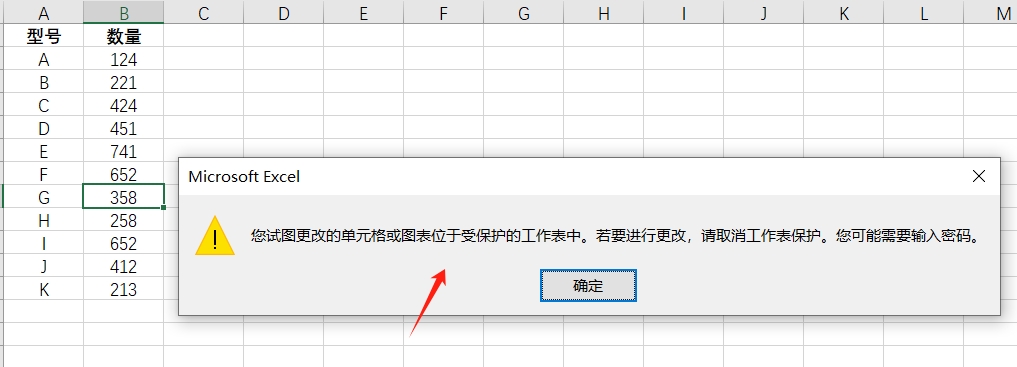
Setting method two:
If you want to restrict more non-editable areas, take the following picture as an example. If you want the "Quantity" column to be editable, other areas cannot be edited, that is, the requirements for "Method 1" are the same. On the contrary, you can use "Method 2".
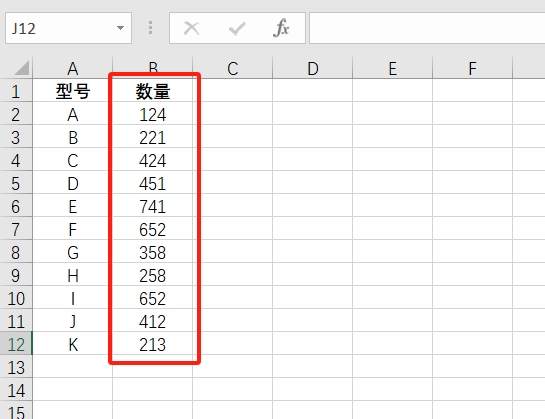
Setup steps:
1. The previous steps are the same. After selecting the entire table, click the right mouse button [Format Cells]. When the dialog box pops up, this time you need to check the [Lock] option, and then click [OK].
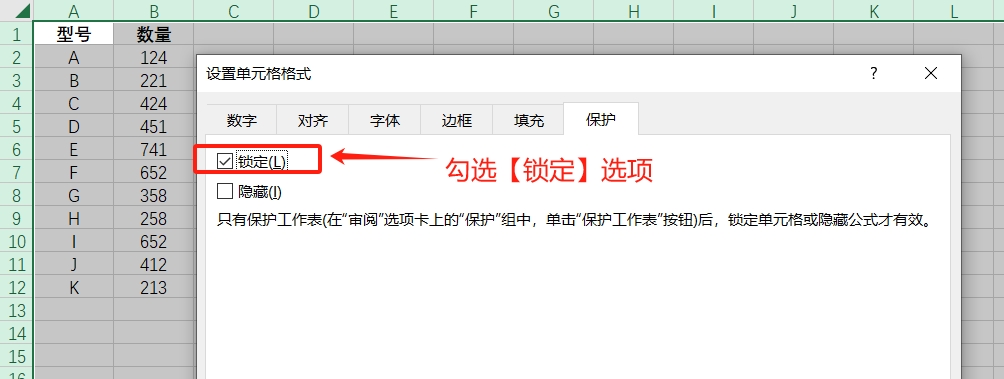
2. Return to the cell, select the area you want to edit with the mouse, then right-click the mouse and select [Format Cells]. After the dialog box pops up, this time remove the "tick" in front of [Lock], and then click 【Sure】.
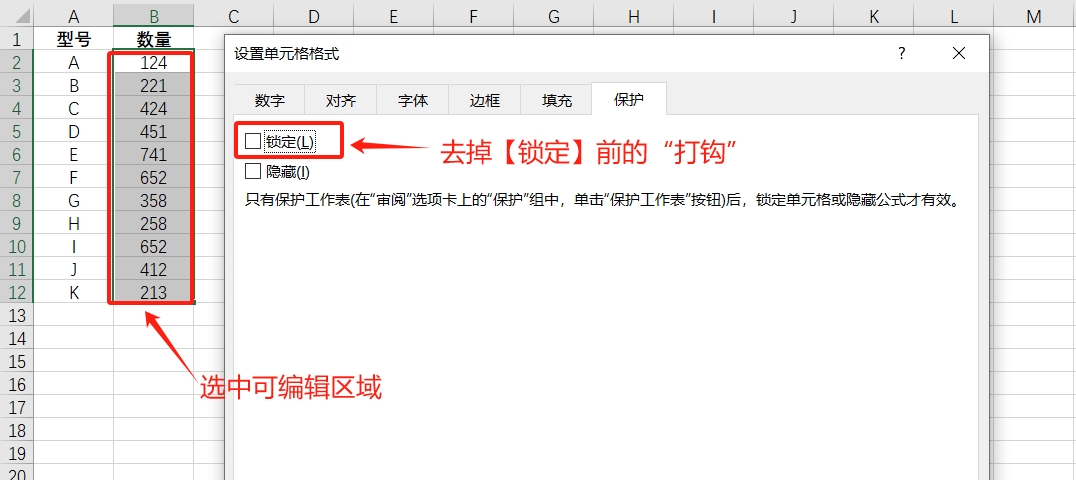
3. The following steps are the same as "Method 1". Click [Protect Worksheet] in the [Review] list of the menu tab, then enter the password you want to set in the pop-up dialog box, and click [OK] Enter it again, and the "restricted editing area" of the Excel table will be set.
As you can see, except for the "Quantity" column of the selected area, which can be edited and changed, other areas cannot be changed and require a password.
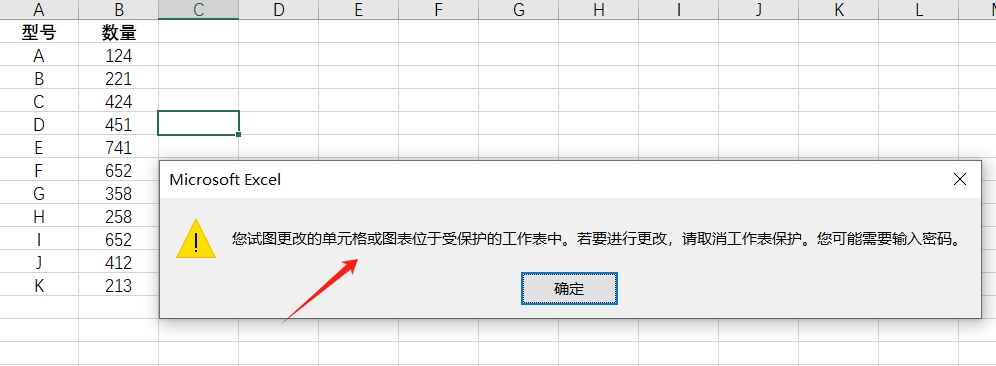
Оба вышеуказанных двух метода защиты можно отменить. Метод один и тот же. Вам нужно только нажать [Отменить защиту листа] в списке [Просмотр] вкладки меню, а затем в всплывающее диалоговое окно. После ввода первоначально установленного пароля и нажатия кнопки [ОК] «Ограниченная область редактирования» Excel будет отменена.
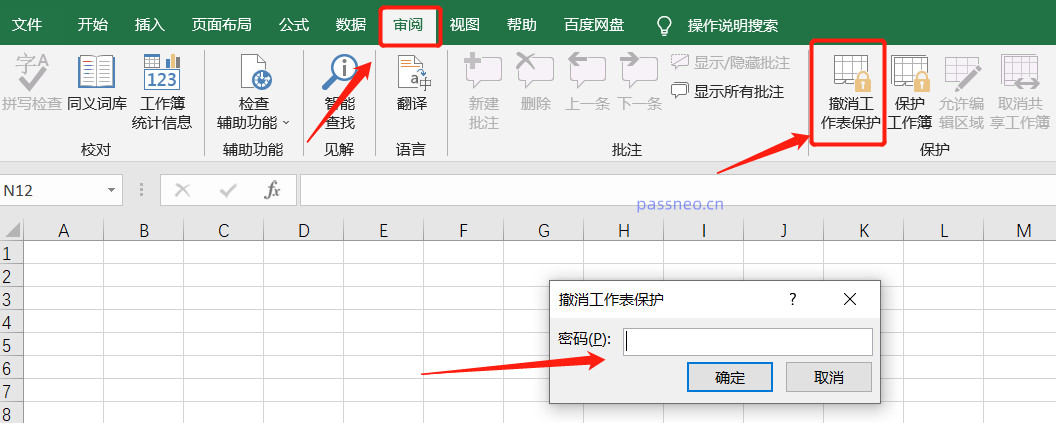
Как видно из приведенных выше операций, для отмены защиты Excel необходимо ввести изначально установленный пароль, поэтому обязательно запомните или сохраните пароль.
Если вы случайно забыли свой пароль, вам нужно использовать другие инструменты для решения проблемы.
The above is the detailed content of How to 'limit the editing area' in an Excel table?. For more information, please follow other related articles on the PHP Chinese website!

Hot AI Tools

Undresser.AI Undress
AI-powered app for creating realistic nude photos

AI Clothes Remover
Online AI tool for removing clothes from photos.

Undress AI Tool
Undress images for free

Clothoff.io
AI clothes remover

Video Face Swap
Swap faces in any video effortlessly with our completely free AI face swap tool!

Hot Article

Hot Tools

Notepad++7.3.1
Easy-to-use and free code editor

SublimeText3 Chinese version
Chinese version, very easy to use

Zend Studio 13.0.1
Powerful PHP integrated development environment

Dreamweaver CS6
Visual web development tools

SublimeText3 Mac version
God-level code editing software (SublimeText3)

Hot Topics
 1386
1386
 52
52
 5 Things You Can Do in Excel for the Web Today That You Couldn't 12 Months Ago
Mar 22, 2025 am 03:03 AM
5 Things You Can Do in Excel for the Web Today That You Couldn't 12 Months Ago
Mar 22, 2025 am 03:03 AM
Excel web version features enhancements to improve efficiency! While Excel desktop version is more powerful, the web version has also been significantly improved over the past year. This article will focus on five key improvements: Easily insert rows and columns: In Excel web, just hover over the row or column header and click the " " sign that appears to insert a new row or column. There is no need to use the confusing right-click menu "insert" function anymore. This method is faster, and newly inserted rows or columns inherit the format of adjacent cells. Export as CSV files: Excel now supports exporting worksheets as CSV files for easy data transfer and compatibility with other software. Click "File" > "Export"
 How to Use LAMBDA in Excel to Create Your Own Functions
Mar 21, 2025 am 03:08 AM
How to Use LAMBDA in Excel to Create Your Own Functions
Mar 21, 2025 am 03:08 AM
Excel's LAMBDA Functions: An easy guide to creating custom functions Before Excel introduced the LAMBDA function, creating a custom function requires VBA or macro. Now, with LAMBDA, you can easily implement it using the familiar Excel syntax. This guide will guide you step by step how to use the LAMBDA function. It is recommended that you read the parts of this guide in order, first understand the grammar and simple examples, and then learn practical applications. The LAMBDA function is available for Microsoft 365 (Windows and Mac), Excel 2024 (Windows and Mac), and Excel for the web. E
 How to Create a Timeline Filter in Excel
Apr 03, 2025 am 03:51 AM
How to Create a Timeline Filter in Excel
Apr 03, 2025 am 03:51 AM
In Excel, using the timeline filter can display data by time period more efficiently, which is more convenient than using the filter button. The Timeline is a dynamic filtering option that allows you to quickly display data for a single date, month, quarter, or year. Step 1: Convert data to pivot table First, convert the original Excel data into a pivot table. Select any cell in the data table (formatted or not) and click PivotTable on the Insert tab of the ribbon. Related: How to Create Pivot Tables in Microsoft Excel Don't be intimidated by the pivot table! We will teach you basic skills that you can master in minutes. Related Articles In the dialog box, make sure the entire data range is selected (
 If You Don't Use Excel's Hidden Camera Tool, You're Missing a Trick
Mar 25, 2025 am 02:48 AM
If You Don't Use Excel's Hidden Camera Tool, You're Missing a Trick
Mar 25, 2025 am 02:48 AM
Quick Links Why Use the Camera Tool?
 Use the PERCENTOF Function to Simplify Percentage Calculations in Excel
Mar 27, 2025 am 03:03 AM
Use the PERCENTOF Function to Simplify Percentage Calculations in Excel
Mar 27, 2025 am 03:03 AM
Excel's PERCENTOF function: Easily calculate the proportion of data subsets Excel's PERCENTOF function can quickly calculate the proportion of data subsets in the entire data set, avoiding the hassle of creating complex formulas. PERCENTOF function syntax The PERCENTOF function has two parameters: =PERCENTOF(a,b) in: a (required) is a subset of data that forms part of the entire data set; b (required) is the entire dataset. In other words, the PERCENTOF function calculates the percentage of the subset a to the total dataset b. Calculate the proportion of individual values using PERCENTOF The easiest way to use the PERCENTOF function is to calculate the single
 You Need to Know What the Hash Sign Does in Excel Formulas
Apr 08, 2025 am 12:55 AM
You Need to Know What the Hash Sign Does in Excel Formulas
Apr 08, 2025 am 12:55 AM
Excel Overflow Range Operator (#) enables formulas to be automatically adjusted to accommodate changes in overflow range size. This feature is only available for Microsoft 365 Excel for Windows or Mac. Common functions such as UNIQUE, COUNTIF, and SORTBY can be used in conjunction with overflow range operators to generate dynamic sortable lists. The pound sign (#) in the Excel formula is also called the overflow range operator, which instructs the program to consider all results in the overflow range. Therefore, even if the overflow range increases or decreases, the formula containing # will automatically reflect this change. How to list and sort unique values in Microsoft Excel
 How to Format a Spilled Array in Excel
Apr 10, 2025 pm 12:01 PM
How to Format a Spilled Array in Excel
Apr 10, 2025 pm 12:01 PM
Use formula conditional formatting to handle overflow arrays in Excel Direct formatting of overflow arrays in Excel can cause problems, especially when the data shape or size changes. Formula-based conditional formatting rules allow automatic formatting to be adjusted when data parameters change. Adding a dollar sign ($) before a column reference applies a rule to all rows in the data. In Excel, you can apply direct formatting to the values or background of a cell to make the spreadsheet easier to read. However, when an Excel formula returns a set of values (called overflow arrays), applying direct formatting will cause problems if the size or shape of the data changes. Suppose you have this spreadsheet with overflow results from the PIVOTBY formula,





